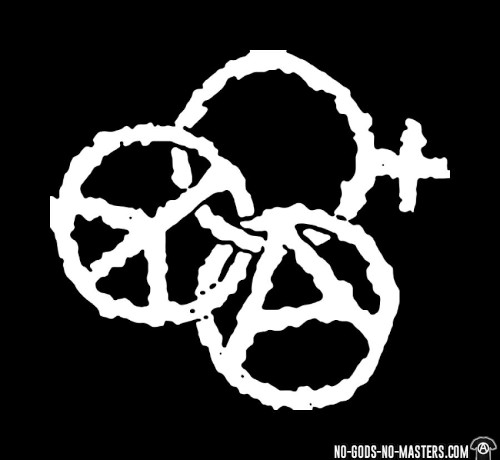‘“Peace, peace,” they cry’ – Jeremiah
‘The greatest challenge of the day is how to bring about a revolution of the heart’
– Dorothy Day
On Armistice Day, I joined the march for Palestine as it snaked round Victoria. I sighed, I sat down on some steps, looked at the last yellow leaves left on the trees and on the ground and renewed my conviction that at heart I am an anarchist.
Given all that’s written on the subject, how am I qualified to count myself in that number?
If a stranger asked me to qualify my self-claimed status as an anarchist, I would struggle to put words together. It is indeed a feeling that ‘something just ain’t right.’
The pro-Palestine marches, every week since 7 October, call for a ceasefire, a set of rules and agreements in war. Hardly anyone dares call for ‘No More War’, dares call for a higher goal for humanity, the peace that is necessary for life. The cries of ‘Ceasefire’ drown out the cries for ‘No more war!’
In my heart, I am an anarchist for all sorts of reasons. But the jolt that blasted into my head that day was that in personal, everyday relationships too, there are rules and structures, sometimes hidden, that work against the humanity, desire for good and hard work of all participants.
The first time I was arrested was for an Ash Wednesday action against nuclear weapons. John Dear, the US peace activist, who happened to be in town at the time, said: ‘You are a peace maker forever!’ I thought, ‘Yes!.’ Only resisting nuclear weapons – anyone can do that – but what about peace in daily life, family, relationships, the workplace?
Through my experience visiting refugee camps here and in the acres of paraphernalia of the Calais border, I have witnessed how the state relies on violence to exist.
So, if I am to be a peace activist, I must also be anarchist. A march, such as this one, is termed ‘peaceful’ and calls for an end to violence. However, the state views it as violent, in that it challenges the very existence of violence and therefore of the state (Judith Butler).
But oppressive structures exist not just in states. Family, marriage, workplace, voluntary roles all possibly turn out to have unjust frameworks that stubbornly resist being challenged.
Many, such as safeguarding, health and safety, employment law, legal partnership of marriage even, are intended to be beneficial, but when left to ossify, unexamined, they can turn into oppressive structures leading to secrecy and hurt.
Teaching English at a small charity recently, I was asked to send all lesson plans and schemes of work to the manager, a first for me. But then, when I am alone with my students in the classroom, there is a kind of privacy. The temptation is to sneak in some forbidden topics.
When work is undertaken from personal convictions, which hopefully most work is, it takes a brave volunteer or employee to stand up against the rules of the organisation however benign.
But there is also a sense of dismay when unhelpful restrictions are in conflict with the worker’s own sense of justice. Disappointment sets in when decisions are made badly, things are run in a certain way because that’s how they’ve always been.
My gradual realisation as a peace activist, in areas of daily life that have not been peaceful, is that anarchism is present as a source of potential rescue.
On the one side, legal structures haven’t helped, in fact become actually dangerous. On the other side are human relationships, where true and honest open communication is the prize.
There are countless legal frameworks for how to run a war: don’t bomb hospitals or civilians. Premature babies can’t wait while legal scholars write explainers in newspapers on whether the IDF could ever be justified in bombing the al-Shifa hospital in Gaza.
Surely we need no law to tell us it’s wrong to bomb civilians or indeed anyone.
As Carl von Clausewitz, the military theorist, wrote on the dangers of laws on war: ‘sooner or later, someone will come along with a sharp sword and hack off our arms.’ Laws have no currency in such desperate times.
I search for the truth in my heart, helped by a picture of Vivien Silver, peace activist murdered by Hamas, who said: ‘We refuse to accept a cycle of wars that only brings death, destruction and pain.’ What’s needed right now is our common belief in life and humanity.
‘They [cry] “peace, peace” when there is no peace’ – Jeremiah


